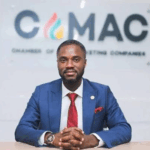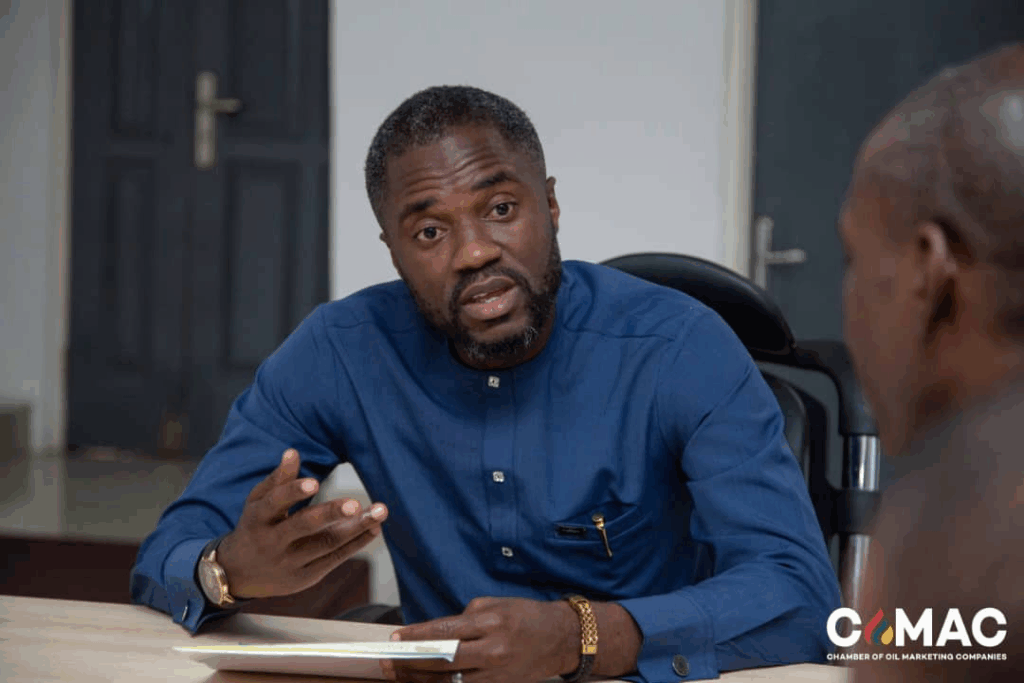
The Chamber of Oil Marketing Companies (COMAC), formerly the Association of Oil Marketing Companies (AOMC), was established in 2003 as the umbrella body for petroleum marketing operators in Ghana.
Representing Oil Marketing Companies (OMCs) and Liquefied Petroleum Gas Marketing Companies (LPGMCs), COMAC serves as the collective voice of the downstream petroleum industry, advocating for policies and initiatives that safeguard member interests and promote sustainable growth.
In 2024, the successful transformation of the Association of Oil Marketing Companies (AOMC) into the Chamber of Oil Marketing Companies (COMAC) by its CEO Dr. Riverson Oppong marked a bold repositioning. This milestone enhanced COMAC’s credibility, expanded stakeholder reach, and amplified its visibility across Ghana’s downstream petroleum sector.
Currently representing 213 members made up of 170 OMCs and 43 LPGMCs COMAC also works closely with key national stakeholders, including the Ministry of Energy, NPA, GRA, EPA, GNFS, BOST, and others. As an advocacy and research-driven institution, COMAC has worked to shape policy, legislation, and regulation while championing operational excellence.
Over the years, the chamber has become a trusted partner to government, regulators, and stakeholders, driving innovation and progress across Ghana’s downstream petroleum sector.
Under the leadership of its dynamic Chief Executive Officer, Dr. Riverson Oppong, who also serves as SPE Africa Regional Director, the Chamber of Oil Marketing Companies has recorded significant progress in recent years.
Dr. Oppong’s strategic and energetic management approach has been widely credited for strengthening the Chamber’s influence and advancing its advocacy efforts within Ghana’s downstream petroleum sector. Today, COMAC is recognized as the leading advocacy body and knowledge hub for Ghana’s downstream petroleum sector, hampioning safety, innovation, and sustainable growth.

As part its brand positioning, COMAC has consistently partnered with the National Petroleum Authority (NPA) to implement price deregulation, combat smuggling and adulterated fuels, and collaborated with the Ghana Revenue Authority (GRA) to improve tax processes.
Its role in developing the ERDMS system ensures secure, transparent transactions. COMAC also conducts nationwide safety audits and introduced a mystery shopping initiative in 2024, achieving a 79.51% compliance rate and reducing safety incidents.
Industry Report: In October 2025, in its release of the 2025 Mid-Year Industry Report on the Petroleum Downstream Sector, revealed several infractions and irregularities in the volumes of petroleum products sold by some smaller oil marketing companies.
The chamber stressed that some OMCs and individuals may be misreporting product distribution data and vowed to expose its members who fail to comply with regulations governing the petroleum downstream sector and instead engage in illegal activities to the detriment of the majority of industry players.
As part of its achievements under Dr. Oppong, COMAC Produced a documentary in December 2024, which offered the public a deeper understanding of the downstream industry’s contribution to Ghana’s economic development.
Downstream Dialogue: This pioneering flagship event, organized by COMAC (in 2025), convened industry leaders to deliberate on sector challenges and opportunities. The discussions culminated in the production of the Downstream Dialogue White Paper, which has become a strategic blueprint for industry stakeholders.
The event also attracted significant media attention and high-level attendance, further amplifying its impact.
Mystery shopping exercise: Additionally, COMAC conducted nationwide assessments of 191 petroleum retail outlets and 25 LPG plants, reinforcing HSSE standards. These “mystery shopping” exercises or unannounced visits and inspections, which were conducted across five regions, strengthened accountability and continuous improvement in safety practices.
Policy Advocacy: COMAC played an instrumental role in shaping downstream energy reforms by influencing discussions on price floor implementation, debt restructuring, and zonalization inefficiencies through evidence based research and regulator engagement.
Partnerships with the National Petroleum Authority (NPA) advanced price deregulation, curbed smuggling and dumping, and reduced the circulation of adulterated fuels. Engagements with the Ghana Revenue Authority (GRA) improved tax handling processes, while contributions to the Enterprise Relational Database Management System (ERDMS) promoted transparency and secure transaction. 8.Academia: COMAC awarded five scholarships for petroleum-related studies and provided 30 internships and mentorship opportunities to students, nurturing future leaders in the energy sector and building a strong bridge between academia and industry.
9.Bloomberg Engagement: The visit and collaboration with Bloomberg, a global leader in financial data and intelligence, positioned COMAC as a credible source of international industry insights. This amplified Ghana’s downstream petroleum narrative on the global stage, enhanced investor confidence, and strengthened opportunities for international partnerships.
Strategic Partnerships and International collaborations: Collaborations with KNUST’s College of Engineering, the University for Development Studies in Tamale, the Petroleum Hub Development Corporation (PHDC), and the Africa Centre for Energy Policy (ACEP) bridged academia, policy, and industry to foster sustainable growth and innovation in the sector.
On the international front, COMAC deepened its influence through collaborations with the Major Oil Marketers Association of Nigeria (MEMAN) and the Petroleum Institute of East Africa (PIEA) in Kenya, facilitating knowledge exchange, technical expertise, and best practice sharing across borders.
Pricing Outlooks: COMAC is now recognized as the trusted source for downstream petroleum pricing forecasts, with its monthly publications guiding policymakers, industry players, and the general public.
PetFun Games 2025: Last but not least the industry-wide event brings together OMCs, LPGMCs, BIDECs, regulators, and other stakeholders for a vibrant day of sports, networking, and wellness.
The strong participation from companies across the sector, combined with extensive media coverage, highlighted the event’s success and wide industry appeal. COMAC’s commitment to promoting health and well-being, also led to a partnership with the University of Ghana Medical Centre to provide free health screenings for members.
Effects of Rebranding Result: Transforming from AOMC to COMAC has sharpened organizational identity. The rebrand increased stakeholder trust, expanded membership and partnership opportunities, multiplied media appearances, and led to growth in public following (on social media and in general stakeholder awareness). It helped COMAC to be seen as more modern, authoritative, and inclusive, aligning its visibility with its expanded role in policy, safety, and sector leadership.
The Chamber of Oil Marketing Companies (COMAC) continues to strengthen its influence within Ghana’s downstream petroleum sector under the leadership of its CEO, Dr. Riverson Oppong. Industry observers note that COMAC’s renewed visibility, strategic positioning and enhanced stakeholder engagement reflect the Chamber’s growing impact and direction.
One of the standout achievements under Dr. Oppong’s tenure is the introduction of the Downstream Dialogue, which has quickly emerged as COMAC’s flagship initiative and a pioneering platform within the country’s energy ecosystem. As the first forum of its kind, the Dialogue has successfully brought together regulators, policymakers, academia and industry leaders for open, solution-driven discussions on opportunities and challenges in the downstream sector.
The inaugural edition attracted strong media attention and high-level participation, reinforcing the Dialogue’s credibility and underscoring COMAC’s role as a trusted convener and thought leader. By bridging diverse stakeholder groups and promoting evidence-based conversations, the initiative has set a new standard for collaborative engagement in Ghana’s downstream petroleum space.
This momentum has cemented COMAC’s reputation as a strategic driver of industry transformation, contributing to a more informed, transparent and future-ready downstream sector.
As recognition of its rising influence, COMAC has been shortlisted for Brand of the Year at the 9th Ghana Energy Awards, scheduled to take place on Friday, 28th November, at the Labadi Beach Hotel.